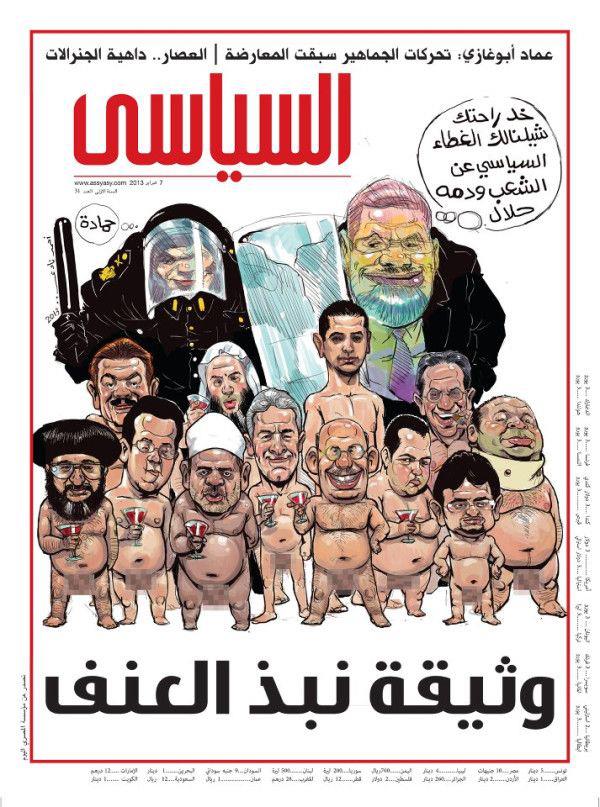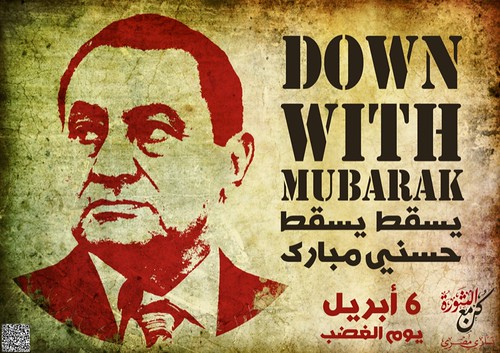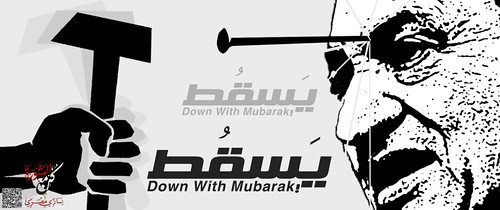Read it here
Tag: mubarak
Under Morsi, Red Lines Gone Gray
Jonathan Guyer, in Jadaliyya, looks at political cartooning under Mubarak, Morsi and the military. His very interesting article (based on a year’s worth of Fulbright research) confirms my sense that there was more freedom of expression under Morsi than before or after — not because the Brother’s weren’t authoritarian, but because they weren’t able to impose their control. All those cases brought against journalists and others for insulting the presidency were also the result of the fact that the presidency was getting mocked and criticized as never before.
The most significant change in Egyptian caricature since 2011 is the implicit permissibility of satirizing the president. Nevertheless, during President Mohamed Morsi’s year in office, the same penal code article maintained that “whoever insults the president… shall be imprisoned.” Yet, according to Judge Yussef Auf, it does not clearly stipulate what insulting the president means or what the precise penalty should be.[3] Additionally, nearly seventy other articles limit freedom of expression. These range from prohibitions against “insults” to the parliament, army, courts, and other public authorities, to injunctions against the reporting of false news. Nonetheless, mocking these institutions became a core part of cartooning even in government-run newspapers, in spite of—or because of—these regulations.

Boutef’s re-election: how does he compare?
Given the outcome of the 1999 elections, it was important for Bouteflika to establish an independent base of support, one that would free him from the whims of the generals who put him in power. Though Algeria’s 2002 elections recorded what was then the lowest turnout since independence, the outcome indicated the growing power of Bouteflika’s electoral machine. The FLN — a party that had seemed moribund in the 1990s — took 51 percent of the seats in Parliament. This surprising show of strength was repeated in October at the local level. Though Bouteflika has been officially independent from the FLN since 1999, the reconstituted FLN provided him with the foot soldiers to bring people to the ballot box. The formation of the “presidential alliance” — a three-party coalition led by the FLN — would later guarantee the Bouteflika camp’s total electoral hegemony. Still, Islamist parties performed well in 2002, despite severe restrictions on many candidates; the largely secular-left Berber opposition stayed true to an electoral boycott stemming from the 2001 unrest in Kabylia.
As the April 2004 presidential contest approached, there were indications that elements of the security-military-intelligence apparatus were starting to see Bouteflika as a threat. Bouteflika’s Brutus stepped forward in 2003, when Prime Minister and FLN Secretary-General Ali Benflis — none other than Bouteflika’s 1999 campaign manager — declared his intent to run. Yet even with the FLN divided and Benflis’ candidacy supported by powerful figures in the security oligarchy, Bouteflika sailed to an impressive 85 percent margin of victory, on turnout of nearly 60 percent. Benflis, who quickly disappeared from the political scene, managed to pull in 6 percent.
With his 2004 reelection, it was clear that Bouteflika had established the independent base. A growing ensemble of stakeholders, from traditionalist elements of Algerian Islam to veterans’ and war martyrs’ groups, provided Bouteflika with his own means of reaching down to the grassroots. An Algerian sociologist has provisionally termed this coalition Bouteflika’s makhzan, in reference to the patron-client networks that have allowed the Moroccan monarchy to rule for centuries.
There was perhaps no greater indication of Bouteflika’s triumph than the June 2004 “retirement” of Army Chief of Staff Gen. Mohammed Lamari, architect of the dirty war in the 1990s, and the 2005 posting of retired Gen. Larbi Belkhir to the embassy in Morocco. Belkhir, a key player for decades, had reportedly championed Bouteflika in 1999 in the face of the skepticism of others and subsequently ran the president’s office. Bouteflika’s new chief of staff and deputy defense minister were trusted allies. With Khaled Nezzar (mastermind of the 1992 coup) sulking in his villa, there appears to be little left of the cadre of “deciders” who allegedly manipulated events behind the scenes in the 1990s, except for long-time intelligence head Mohamed “Tewfik” Medienne, who, like the Wizard of Oz, seems to instill fear simply by staying out of the public eye.
It was only after his 2004 reelection that Bouteflika fulfilled his end of the bargain with those who had put him into office. On February 27, 2006, the presidential cabinet, chaired by Bouteflika himself, used a special rule to ratify the National Peace and Reconciliation Charter while the parliament was in recess. Though the Charter had ostensibly passed a national referendum in September 2005, there were doubts as to the authenticity of turnout figures. In its final form, the law amnestied insurgents who surrendered after January 2000, including those facing criminal proceedings or held in prison, while at the same time opening a new six-month window for more insurgents to surrender. At the same time, the Charter kept the same restrictions on amnesty as the 1999 Civil Concord, but those found guilty of unprotected offenses could receive reduced sentences. For the families of the “disappeared” or those abducted by armed opposition groups, death certificates could be issued once all investigations had been completed. Perhaps the most important aspect of the Charter was that, for the first time, the government extended full immunity to the security and military forces, including civilian militias. Merely to criticize the actions of the government or its agents during the “national tragedy” of the 1990s was made a criminal act.
Mundy ends declaring:
Bouteflika’s victory is now almost total. He has conquered the generals, kept the FIS from returning in any form, staved off democratic challenges from his own party and the Kabyle Citizens’ Movement, and won the right to a third, or even fourth, term. The challenges he faces now seem almost quaint by comparison: residual political violence, high unemployment, widespread disillusionment with government and the state’s near total dependence on hydrocarbons.
Well perhaps Algeria has not made this transition from military oligarchy to dictatorship, it’s successfully used an old-generation figure to pass control over to a new generation of oligarchs. And the problem with such coalitions around a transitional figure is that they might very easily collapse with his passing. In the meantime this Algerian election was profoundly depressing when you consider what a regression it constitutes.
I am inspired by the Moroccan blogger Larbi to tally up the top five most “popular” Arab presidents:
– At number one, like his father unrivaled, Bashar al-Assad at 97% but only in power for a mere nine years (re-elected 29 May 2007).
– At number two, the indefatigable Zein al-Abideen Ben Ali with 94.49%, still going strong after 22 years. Like Bouteflika, he had to amend the constititution to be able to run again (re-elected 24 October 2004).
– Slipping in at third position, the hero of the hour, Abdel Aziz Bouteflika who managed an impressive 90.24% and quite a strong show for an election many were boycotting. Thus he singlehandedly reestablishes Boumediennism.
– Our very own Hosni Mubarak wins for longevity (28 years!) but has been slipping in the ranks lately, only achieving 88.5% in the last election (which, mind you, was the first to include other candidates) on 9 September 2005. Better luck in 2012 ya Hosni!
– Finally it’s Yemen’s Ali Abdullah Salah with a measly 77.2% (re-elected 22 September 2006). Let’s hope he tries harder next time.
There’s been a lot of movement in this race since the uncontested champion for most of the 1980s and 1990s, the late lamented Saddam Hussein, gave up his presidency. Will there ever be another like him, who against all odds is perhaps the world’s only politician to win 100% of the vote in a presidential election?
April 6 Strike – what to expect
– You can follow updates on Twitter by using the #6April tag
– A couple of days ago the Karama party (leftist-Nasserist, unrecognized) held a conference in which it announced the latest opposition coalition initiative, the “Coalition of Egyptians for Change”. It includes some of the usual figures from the Muslim Brothers (M. Abul Quddous) and a bunch of intellectuals like Sonallah Ibrahim and Alaa al-Aswaani. Here’s a MET story on it that might exaggerate its import – remember it’s not the first time such a coalition is formed, it should not have to be re-formed.
– The socialist Tagammu party is joining the strike, and Ayman Nour (I’m not sure you can say there remains much of a Ghad party, even if he is rebuilding) has backed it, as has the fledging Democratic Front. The liberal Wafd is against the strike, although some of the writers in its paper back it. Presumably the Nasserists back it.
– There have been a number of arrests of students and activists ahead of today’s strike, most notably in Kafr al-Sheikh and Cairo. A Muslim Brother blogger, Abdel Rahman Fares has been arrested in Fayoum. Massive security presence expected in Cairo and elsewhere. Watch this al-Jazeera English report for background:
– Protests are being planned at various universities around the country, notably Cairo U. Elsewhere likely to be used in Cairo: the State Council, the Journalists’ Syndicate, the General Federation of Trade Unions, and more.
– The Doctor’s Syndicate will strike on April 9 asking for minimum wage, but there’s some overlap with today. A protest is planned today in front of the Doctors’ Syndicate on Qasr al-Aini St. The Pharmacists’ Syndicate, the Bar Association and the Engineers’ movement have announced they will not participate. Presumably the Judges’ Club is not participating in light of its new pro-regime leadership, although its Alexandria branch still could.
– Hossam Tammam on the Brothers’ participation or non-participation (at this point it remains unclear what they’ll do, even if they’ve announced support for the strike):
In a replay of events last year the MB has declined to take part in the 6 April strike, although it says that it supports strikes as a form of political action guaranteed by the law and the constitution. Justifying its refusal to participate the MB said that as the country’s largest opposition group it should have been consulted. This is more or less what the MB said last year. The excuse is starting to wear thin.
The MB is not known for its ability to maintain alliances outside the circle of Islamic activists or to perform as part of a broad political front. This is a result of the indoctrination that goes on in a closed organisation run through a strict hierarchy and which demands blind obedience to its leaders.
Another reason that prevents the MB from cooperating with other groups is the self-importance it has acquired since it started outperforming other opposition groups in elections. The MB has developed a habit of lecturing others about the great sacrifices it has made over the years.
Even if this were true, harping can only alienate other parties, if not the public as a whole. The fact is the MB’s long history of suffering sometimes makes it act in an isolationist manner, as if it were a closely-knit clan, not a group seeking allies on the local political scene.
– Sandmonkey rants against the whole 6 April phenomenon.
– So does Hossam for very different reasons, namely that it’s not a general strike if large labor unions are not participating. But it will be “a day of protests, a day of rage.” He has some notes on MB youth and rifts on MB policy on this one.
– Zenobia has a bunch of updates.
– Site of 6 April youth. They have two Facebook groups you can join too, one in English and one in Arabic.
I haven’t been out yet today but it appears to be a normal day traffic-wise in Garden City…
On US democracy promotion in Egypt
“Four years ago, the United States talked about two laboratories for democracy in the Middle East: Iraq and Egypt.
Egypt was supposed to be the easier one. But now it’s battered Iraq that has shown democratic advances, while Egypt seems to be going backward with President Hosni Mubarak’s government solidifying its hold on the levers of power.
Still, Egypt is hoping for improved ties with the United States under President Barack Obama after the Bush administration called for reform by Mubarak and after years of strains over the staunch U.S. ally’s human rights record.
The Obama administration has already hinted it won’t hinge its relationship with Egypt on human rights demands, moving away from former President George W. Bush’s ambitious — or overreaching, as some in the region felt — claims to seek a democratic transformation in the region.”
Already some people in Cairo are nostalgic (or have been nostalgic for several years) for that 2004-2005 moment when the Bush administration was publicly, relentlessly, critical of Egypt’s lack of political reform. Ironically Obama, with his charisma, could make an even better democracy promoter than Bush, whose neo-conservative version of democracy promotion appeared like a barely concealed fig leaf for a pro-interventionist, pro-Israeli Middle East policy. The problem remains the same: how do you craft a successful democracy-promotion policy? Can you do so when you have a strategic alliance with a repressive state? I think government-to-government pressure has limited effectiveness, especially when Egypt is such as a great counter-terrorism and regional diplomacy ally. Or when you’re unwilling to reconsider over $1bn of military aid that subsidizes your own military-industrial complex and irrigates the backbone of the regime. (sorry for the terrible mixed metaphor.)
The way to go may be lobbying in the US, EU against businesses involved in Egypt and naming and shaming politicians that support Egypt. But even then you run the risk of becoming the useful idiot of those who claim to be concerned about democracy in Egypt but are merely cynically adding a card to play in regional politics.
New batch of ant-Mubarak posters
Pettiness
Pettiness is one of the defining characteristics of authoritarian political systems: you see it everywhere, from the arbitrary treatment of political opponents like Ayman Nour to the veiled and actual threats made against rebellious parts of the establishment (such as judges, who had their bonuses and benefits cut when they were rebelling in 2006).
Mubarak will not go to Doha Arab summit
Update: Dina Ezzat suggests the Egypt-Qatar rift is about Sudan/Darfur as well as the Palestinians:
The summit, however, is unlikely to escape being the scene of squabbles over managing the reconciliation process between the Darfur leaders and Al-Bashir’s regime. While Qatar is determined to pursue earlier efforts to conclude a comprehensive peace deal on that front other Arab countries — especially Egypt — are determined to deny Doha control over the issue. As a result the summit may not issue a resolution with clear language on the Darfur-Khartoum reconciliation process.
The anticipated Egyptian-Qatari confrontation in Doha next week will not be confined to the management of the Darfur peace process. The diplomatic tug-of-war between the two countries that has continued for 12 months, especially over Palestinian reconciliation, is likely to cast a shadow across the Doha summit. With President Mubarak unlikely — so far — to attend, sending the foreign, or at best, prime minister, Qatar may not be so keen to avoid some squabbling over the text of resolutions to be adopted by the summit on the Palestinian issue. Sources say that Qatar has already suggested to several Arab countries that there is a need to break the “Egyptian monopoly” over Palestinian reconciliation. While this Qatari effort may not succeed — as some Qatari officials acknowledge — it would certainly impact on already tense Egyptian-Qatari relations.
Update II: AP has a write-up saying:
Hosni Mubarak’s decision, which came two days before the summit starts, already throws major doubts on its chances for success as the organization’s foreign ministers pleaded for unity in the face of threats against its members.
WSJ: Egypt addressed arms smuggling issue with Bashir
“Both the U.S. and Egyptian governments have in recent weeks raised with Sudan’s government their concerns that the African country has become a major facilitator for Gaza-bound weapons being smuggled into Egypt, according to officials briefed on the diplomatic exchanges. Washington sent a formal complaint to Khartoum demanding Sudan’s government ‘cease smuggling arms into Egypt,’ according to a U.S. official. The official wouldn’t provide an exact date.
Egyptian President Hosni Mubarak raised a similar complaint with Sudanese President Omar al-Bashir during the African strongman’s visit to Cairo this week, according to a diplomat briefed on the meeting. The Egyptians are particularly concerned that Sudan is becoming an arms partner of Iran and aiding Tehran in moving weapons to the militant group Hamas, which is based in the Gaza Strip.”
So that means Egypt acknowledges arms traffic through its territory from Sudan?
Links for January 13th
Automatically posted links for January 13th:
- Arab Stereotypes in American Film – Jack Shaheen short
- Barack Obama – I’m sure we’ve seen him somewhere before – Armando Iannucci on Obama: it’s dead on
- Comment is free: Laughing at dictatorship – Ibrahim Hudaibi on Mubarak jokes
- Arabs eye £500m Liverpool buy-out | Sport | The Observer – Dubai group to buy Liverpool FC
- Citi Looking Abroad For Major Investors – WSJ.com – Waleed Bin Talal to invest

